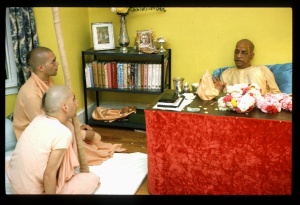SB 10.13.43: Difference between revisions
(Vanibot #0018 edit: make synonym terms in Sanskrit italic in SB - Vanisource) |
(Vanibot #0054 edit - transform synonyms into clickable links, which search similar occurrences) |
||
| Line 23: | Line 23: | ||
<div class="synonyms"> | <div class="synonyms"> | ||
''evam'' | ''[//vanipedia.org/wiki/Special:VaniSearch?s=evam&tab=syno_o&ds=1 evam]'' — in this way; ''[//vanipedia.org/wiki/Special:VaniSearch?s=eteṣu&tab=syno_o&ds=1 eteṣu] [//vanipedia.org/wiki/Special:VaniSearch?s=bhedeṣu&tab=syno_o&ds=1 bhedeṣu]'' — between these boys, who were existing separately; ''[//vanipedia.org/wiki/Special:VaniSearch?s=ciram&tab=syno_o&ds=1 ciram]'' — for a long time; ''[//vanipedia.org/wiki/Special:VaniSearch?s=dhyātvā&tab=syno_o&ds=1 dhyātvā]'' — after thinking; ''[//vanipedia.org/wiki/Special:VaniSearch?s=saḥ&tab=syno_o&ds=1 saḥ]'' — he; ''[//vanipedia.org/wiki/Special:VaniSearch?s=ātma&tab=syno_o&ds=1 ātma]-[//vanipedia.org/wiki/Special:VaniSearch?s=bhūḥ&tab=syno_o&ds=1 bhūḥ]'' — Lord Brahmā; ''[//vanipedia.org/wiki/Special:VaniSearch?s=satyāḥ&tab=syno_o&ds=1 satyāḥ]'' — real; ''[//vanipedia.org/wiki/Special:VaniSearch?s=ke&tab=syno_o&ds=1 ke]'' — who; ''[//vanipedia.org/wiki/Special:VaniSearch?s=katare&tab=syno_o&ds=1 katare]'' — who; ''[//vanipedia.org/wiki/Special:VaniSearch?s=na&tab=syno_o&ds=1 na]'' — are not; ''[//vanipedia.org/wiki/Special:VaniSearch?s=iti&tab=syno_o&ds=1 iti]'' — thus; ''[//vanipedia.org/wiki/Special:VaniSearch?s=jñātum&tab=syno_o&ds=1 jñātum]'' — to understand; ''[//vanipedia.org/wiki/Special:VaniSearch?s=na&tab=syno_o&ds=1 na]'' — not; ''[//vanipedia.org/wiki/Special:VaniSearch?s=iṣṭe&tab=syno_o&ds=1 iṣṭe]'' — was able; ''[//vanipedia.org/wiki/Special:VaniSearch?s=kathañcana&tab=syno_o&ds=1 kathañcana]'' — in any way at all. | ||
</div> | </div> | ||
Latest revision as of 18:24, 17 February 2024

A.C. Bhaktivedanta Swami Prabhupada
TEXT 43
- evam eteṣu bhedeṣu
- ciraṁ dhyātvā sa ātma-bhūḥ
- satyāḥ ke katare neti
- jñātuṁ neṣṭe kathañcana
SYNONYMS
evam — in this way; eteṣu bhedeṣu — between these boys, who were existing separately; ciram — for a long time; dhyātvā — after thinking; saḥ — he; ātma-bhūḥ — Lord Brahmā; satyāḥ — real; ke — who; katare — who; na — are not; iti — thus; jñātum — to understand; na — not; iṣṭe — was able; kathañcana — in any way at all.
TRANSLATION
Thus Lord Brahmā, thinking and thinking for a long time, tried to distinguish between those two sets of boys, who were each separately existing. He tried to understand who was real and who was not real, but he couldn't understand at all.
PURPORT
Brahmā was puzzled. "The original boys and calves are still sleeping as I have kept them," he thought, "but another set is here playing with Kṛṣṇa. How has this happened?" Brahmā could not grasp what was happening. Which boys were real, and which were not real? Brahmā was unable to come to any definite conclusion. He pondered the matter for a long while. "How can there be two sets of calves and boys at the same time? Have the boys and calves here been created by Kṛṣṇa, or has Kṛṣṇa created the ones lying asleep? Or are both merely creations of Kṛṣṇa?" Brahmā thought about the subject in many different ways. "After I go to the cave and see that the boys and calves are still there, does Kṛṣṇa go take them away and put them here so that I come here and see them, and does Kṛṣṇa then take them from here and put them there?" Brahmā could not figure out how there could be two sets of calves and cowherd boys exactly alike. Although thinking and thinking, he could not understand at all.